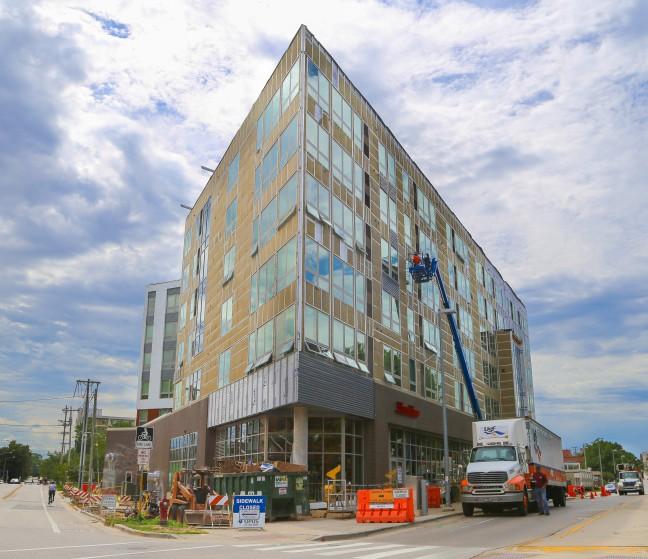It’s not hard to notice those huge 12-story buildings being erected in Madison. These buildings, which are basically skyscrapers on the landscape of Madison, are a large number of luxury apartments being built for future Badgers. While the plan seems geared toward students, it is actually a calculated move by property owners and the City of Madison to transform the neighborhoods that border campus back into single family homes. If the plan works out, one day we could see Mifflin not as the famed street of good times and bad decisions, but a quaint neighborhood with kids and families, and all that comes with that. Let’s be honest, no student wants to see that day come. So if you’re a student sharing a small room and eating ramen for all three meals, and even if you’re not, you should approach the gentrification of student housing with skepticism.
First off, we shouldn’t be building any more student apartments because the student population isn’t growing at a significant rate. According to the Univeristy of Wisconsin’s enrollment statistics and statistics from Cappex.com, in the 2012-2013 and 2013-2014 academic years, undergraduate enrollment at UW hovered around 29,000. Scott Faust of the Isthmus states that his two housing developments, City View and Park Place “are at 90 percent capacity.” This means that students are moving into these apartments, but new students are not coming in droves; they’re filling up luxury apartments instead of other units such as the historic houses of the Bassett, Greenbush, Vilas and Mansion Hill neighborhoods that surround campus.
Renovating these houses back to single family units doesn’t make much sense for anyone except the City of Madison. In fact, the municipal government is giving the current owners of the units massive forgivable loans to renovate them, and then put them on the market to sell to families. However, even after renovation, these homes still wouldn’t be valuable to families. There’s no private parking, and there are no schools in the immediate area. Another obstacle is that there are still many students who are unwilling to leave these neighborhoods. Families probably won’t be too inclined to move into a neighborhood where half of their neighbors have music blasting and projectile red solo cups flying into the lawn from third story balconies at 11:30 p.m. on a Thursday night. Still, worst case scenario could be that students from these neighborhoods will leave and move into the new luxury apartments, while the alleged families willing to move in would never show up, leaving these historic homes and neighborhoods abandoned and susceptible to dilapidation.
My final point takes us back to the luxury apartments. Who can afford these units? Again Scott Faust in the aforementioned Isthmus article admitted that it’s taking longer for these luxury units to fill up due to higher rents. I personally know undergrads who are working 30 hours a week, along with the workload of a full-time student, just to make ends meet. There’s something inherently wrong with that picture from an educational standpoint. Plus, all these luxury accommodations are being built at a time when there’s real demand for affordable housing downtown. Mayor Paul Soglin proposed a plan to add 750 to 1,000 affordable units downtown, but they’ve yet to break ground. Many students will be forced to cram as many of their friends into a small luxury unit in order to pay a rent that’ll still be too high. At a time when the costs of attending a university like UW are already high and rising, students shouldn’t have to be in a financial situation where the payment of rent takes priority over what they’re really here for: an education.
The move to push students closer to campus in these luxury developments, while renovating the older affordable housing units, will drive up the cost of living for students attending UW. The last thing we should be doing is making the pursuit of a college education even more of a privilege for the rich. Walking around downtown today one can see the sickening sight of abject poverty and tremendous wealth existing side by side. For a progressive city like Madison, we shouldn’t be making moves to widen income inequality, and for a university that prides itself on inclusion, we shouldn’t stand by and watch its less wealthy students struggle to afford basic necessities like housing.
Nichalous Pogorelec (pogorelec@wisc.edu) is a sophomore majoring in sociology.


